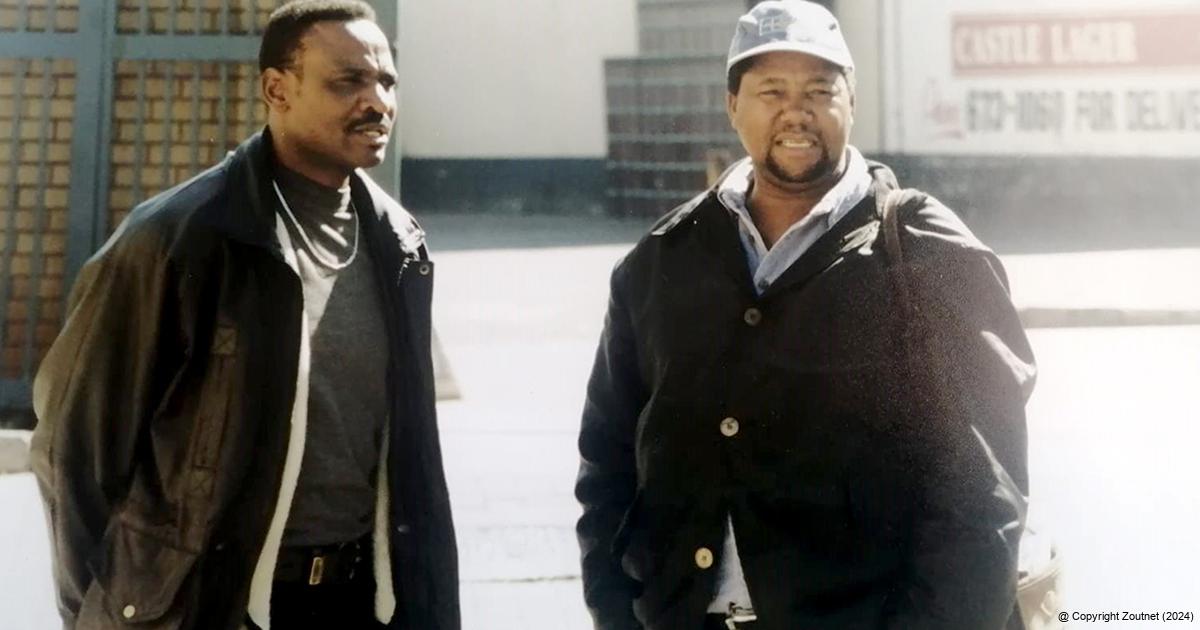

ADVERTISEMENT:

The director of photography for the very first episode, Mr Thomas Mudau, and Mr Noko Ramabula (director of Muvhango). Photo supplied.
Death of popular Venda soapie Muvhango comes as a shock
News - Date: 13 July 2024
The end of an era has arrived with the last episode of the popular television soapie, Muvhango, airing last Thursday. For 27 years, this beloved series was a staple in hundreds of thousands of households, with fans following the lives of their favourite characters as if they were real. Now that the series has ended, many local actors who were part of Muvhango from its inception can only reminisce about the “good old days”.
At its peak, Muvhango attracted viewership figures exceeding 4 million. The show, which first aired in 1997, enjoyed significant success, particularly in the late 2000s and early 2010s, consistently ranking among the most-watched TV programmes in the country.
The SABC has not provided reasons for its decision to cancel the show, but sources within the public broadcaster cited a combination of declining viewership figures and shifts in audience preferences. Like many other players in the media industry, the SABC experienced a significant decline in advertising revenue, which has shifted to other platforms such as social media and YouTube. Sadly, none of these platforms invest in producing content such as local drama series, instead profiting from content created by others, lamented one source.
Muvhango was unique in its reflection of Vhavenda culture and was primarily produced in Tshivenda. Other languages were later introduced, often to the dismay of purists, but the show grew in popularity across many cultures.
For the Vhembe actors present when the series started, this feels like the funeral of a beloved family member. Limpopo Mirror interviewed Tshivhiyahuvhi Jackson Munonde, known in the broadcasting industry as TJ, and some of his fellow former Muvhango cast members over the past weekend.
TJ, a former Radio Venda station manager, was one of the actors known as Vho Gizara when the soap opera debuted in 1997. He remembers that most of the cast members who starred in the first episodes were from his Radio Venda production team.
“After Duma Ndlovu wrote the drama in the early 1990s, he came to Venda to visit Agri Dzivhani, who had a drama training school in Venda and was also an actor of note at the time. When he realised that Dzivhani only had teenagers at the school, he approached me to help him find adult actors,” said TJ.
From Phalaphala FM’s radio drama section, they auditioned well-known drama actors such as Tendani “Maswigiri” Mulaudzi, Salome Mutshinya, Thivhulawi Nyadzhiwa, and others.
When asked why “Muvhango” had started using other languages instead of continuing exclusively in Tshivenda, Munonde said the main reason had been to expand the audience.
“We wanted to spread our wings and reach as many households as possible across the country. We knew that if it failed to attract many viewers, the SABC might cancel it because it had to generate money,” he said.
The director of photography for the very first episode, Mr Thomas Mudau, said that working with actors and actresses from the radio station had been very encouraging as they had been a step ahead of other actors. “It was as if they were tailor-made for the soapie. We really enjoyed working with them,” he said.
One of the actors who had a brief stint on the soapie, Mrs Salome Mutshinya, was cast as the wife of Mashudu Mukwevho, a character who passed away at the beginning of the soap opera. Her character introduced one of the many intriguing plots, reflecting cultural dilemmas. In this case, it concerned two women married to one man, who ended up fighting for his body after he had passed away.
Mutshinya said she had not given up watching the drama after her character had no longer been needed but continued watching it as she was very proud of being one of the first Muvhango actors. “I am still very proud to have been one of the first pioneers in the Tshivenda soap opera in the country,” she said.
The show’s producers released a statement expressing their gratitude to the loyal fans who supported the show throughout its journey. It has made a significant impact on South African television, providing a platform for numerous actors and addressing important social issues pertaining to all cultural and indigenous groups in the country, the producers said.

Recent Articles
-

Moyo starts a new life by selling his jujube
31 August 2024 -

Makonde women make jam from wild fruits to help create jobs
31 August 2024 By Victor Mukwevho -

At age 104, war veteran Sadiki only wishes for a toilet inside his house
31 August 2024 By Maanda Bele -

Rivoni School for the Blind nearing completion - at last
31 August 2024 By Thembi Siaga
Search for a story:

ADVERTISEMENT


Victor Mukwevho
Victor Mukwevho Ne-vumbani joined the Mirror during it's inception in 1990. He joined the SABC newsroom in 1995, and was known by listeners as "A u fhedzisela ari". He was a news editor for The Tembisan Newspaper from 2007 to 2015. He rejoined the Limpopo Mirror newspaper in June 2022 as a freelance journalist.
Email: [email protected]

ADVERTISEMENT:

